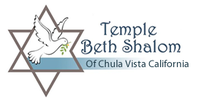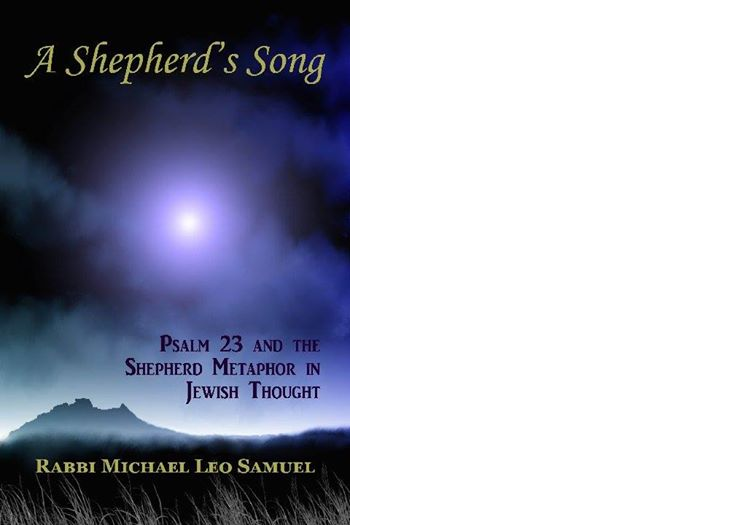Posted on 01 May 2014.
A Shepherd’s Song: Psalm 23 and the Shepherd Metaphor in Jewish Thought by Rabbi Michael Leo Samuel, Kodesh Press, New York, NY; ISBN 978-0-61599-132-0 ©2014, $22.95, p. 360, plus Notes and Index
By Fred Reiss, Ed.D.
Fred Reiss, Ed.D
Rabbi Michael Leo Samuel
WINCHESTER, California — Psalm 23 is arguably the most well known of the one hundred fifty psalms. Its opening line, “The Lord is my shepherd, I shall not want” presents a powerful image of the most awesome entity in the universe providing you a comfortable place to rest, all you can eat and drink, and even protection from your enemies. How bad is that? To get these, all you have to be is ……… a sheep.
Being a sheep is by and large not a good thing. The word sheep generally describes those who blindly follow others regardless of consequences. It also conjures up phrases like, “a sheep being led to the slaughter.” Likewise, I cannot possibly imagine today’s Jewish mother kevelling as she tells others that her son is becoming a shepherd.
Indeed, a shepherd has been a pejorative term going back almost two thousand years. In a Midrash to the Book of Psalms, the third century Rabbi Yosi bar Hanina noted that there is no occupation more degrading than that of a shepherd who walks around like a beggar holding a staff and bag in hand. Yet, Jacob applied this epithet to God (Gen. 48:15) and King David said, “The Lord is my shepherd” (Ps. 23:1).
We now have a conundrum. How can it be that such negative images combine to offer a commanding and enduring picture? Michael Samuel, Rabbi of Temple Beth Shalom in Chula Vista, California, tackles Psalm 23’s influential metaphor of shepherd and sheep in his latest book A Shepherd’s Song. Samuel recognizes these inherent problems in the shepherd/sheep metaphor and asks, for example, how Jews can still recognize a personal relationship with God in light of the Holocaust. Additionally, he notes that our age of science and technology gives the illusion that we are self-sufficient; thereby reducing our “spiritual sensitivity,” which further separates the sheep from the shepherd.
A Shepherd’s Song invites the reader to look deeply into the message of Psalm 23, particularly as it applies to the shepherd, which Samuel calls a “root metaphor,” a symbol of the “community’s beliefs, values and behavior.” By this he means that the answer that Judaism gives to the shepherd metaphor carves out one facet of how the religion acknowledges important universal events, such as birth, life, marriage, and death, as well as engages collective mysteries: Is God personal or aloof? Who gets to heaven? How does the individual affect the collective? Samuel tells us that “metaphors of God function as the template for all human behavior.” Judaism’s answers to universal questions would be much different if the psalmist could have legitimately written, “The Force is with me, I shall not want,” or “To Whom It May Concern, I have all that I need.”
We are treated to the general topic of metaphors as seen through the eyes of Greek philosophers, Talmudic rabbi, Jewish scholars of the Middle Ages, and modern sources. As for the Hebrew Bible, metaphor becomes a synonym for anthropomorphism, the attribution of human forms to God, such as: “the hand of God” (Job 19:21), “you may see My back, but not My face” (Ex. 23:33), and “the sound of God walking in the garden, (Gen. 3:8),” etc. The rabbis understood that the Bible is written “in the language of the people,” nonetheless, they often employed these figurative descriptions without emphasizing that God has no image and therefore cannot have physical features.
Samuel relates the disapprobation that Maimonides held with regard to any terms that give visualizations of God and the strong condemnation he held for past and contemporary rabbis for the continued use of terms he felt were the equivalent of idolatry. Maimonides concluded, as did Philo of Alexandria a thousand years earlier, that one cannot say what God is, only what God is not. So how is it that we can say, “The Lord is my shepherd”?
Being caught up in the technological breakthroughs of the modern era, these philosophical debates over anthropomorphisms and biblical metaphors seem to have little meaning for modern synagogue worshipers, and perhaps even the rabbis who lead them. With a loss of metaphor, there is a loss of a personal relationship with God, and a concomitant failure to communicate with God through prayer.
There are deep metaphysical messages about life in Psalm 23, according to Samuel, which he connects to such things as leadership and personal presence. He draws on examples from the Hebrew Bible, particularly notable personages in the Book of Genesis who exhibit both good and bad shepherd-like traits, such as Adam, who is given dominion over the animals; Cain, who abandons his brotherly responsibility; and Joseph when “he literally shepherds to safety his brothers and the people whose welfare God entrusted to him;” along with others, including Moses and King David.
Samuel takes special note of the prophet Ezekiel, who attacks the numerous pre-Babylonian Exile kings of Judea for failing to act as proper shepherds towards their people as a reason for Judea’s defeat. A later prophet, Isaiah II, refers to the Persian king Cyrus, the monarch who allowed the Jews to return to their homeland and rebuild the Temple, as “My shepherd” and “His anointed one.” Pointing out that while referring to a non-Jew as a messiah-like figure seems shocking to the Jewish mindset, Samuel stresses that this assertion places at the forefront the idea that God will choose whomever he wants to fulfill His plan for His flock.
The thorny question of whether or not Psalm 23 can have any meaning in a post-Holocaust world is also tackled in A Shepherd’s Song. Samuel answers that it is historically false to believe that all Holocaust-era rabbis “always acted in the best interests of their flocks,” and he further observes that the Holocaust has given us “a grim reminder that there is no redemption without human actors.” His discussion on the Holocaust ends with a number of moving Holocaust-era stories that portray some or all of his proposed seven qualities of “good shepherding.” Among these are: encouragement, commitment to remain with the community, assistance, and self-sacrifice.
Samuel provides a line-by-line rabbinic, pastoral, and interpretive exegesis of and commentary on Psalm 23, giving us multiple perspectives of this ancient poem: imagery of a shepherd (verses 1-2), a wanderer (verses 3-4), and a host (verses 5-end). The concluding chapters of A Shepherd’s Song focus on ways to increase one’s spirituality through the psalms, especially Psalm 23. Samuel’s preferred method is known as lectio divina, which is regularly setting aside time for the purpose of reading the Hebrew Bible as contemplation and meditation, rather than, say, as a history book or a book of stories, in order to draw closer to God.
In the two appendices, which Samuel titles Excursus 1 and 2, he presents Psalm 23 through the eyes of the great sixteenth century Safed mystic, Isaac Luria, who made Psalm 23 part of the Sabbath meal liturgy, and more extensively through the hapless biblical character Job.
With today’s wireless technology: anklets, collars, ID tags, cameras, and the ubiquitous GPS systems, it is not hard to accept that the job of shepherd may become less valuable and consequently marginalized in places where it now thrives. However, A Shepherd’s Song does a remarkable job clearly and definitively establishing that the messages contained in Psalm 23’s metaphor, which include proper stewardship, alert attendance, caring companionship, guided nurturing, and unconditional love, are as valuable to society today as when the poet uttered the words that became Psalm 23 more than twenty-five hundred years ago.
*
Dr. Fred Reiss is a retired publicand Hebrew school teacher and administrator. He is the author of The Standard Guide to the Jewish and Civil Calendars;Ancient Secrets of Creation: Sepher Yetzira, the Book that Started Kabbalah, Revealed; and a fiction book, Reclaiming the Messiah. The author can be reachedvia [email protected].
You can order the book at:
http://www.amazon.com/Shepherds-Song-Shepherd-Metaphor-Thought/dp/0615991327/ref=sr_1_fkmr1_1?ie=UTF8&qid=1395697932&sr=8-1-fkmr1&keywords=Jewish+thought+A+Shepherd%27s+Song+Psalm+23



 RSS Feed
RSS Feed
